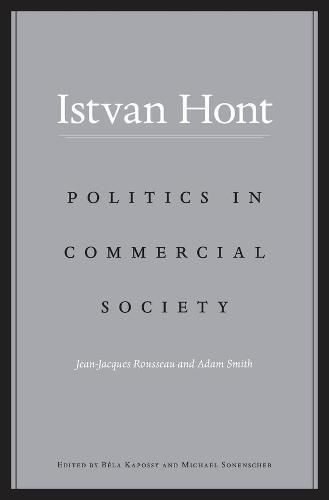Readings Newsletter
Become a Readings Member to make your shopping experience even easier.
Sign in or sign up for free!
You’re not far away from qualifying for FREE standard shipping within Australia
You’ve qualified for FREE standard shipping within Australia
The cart is loading…






Scholars normally emphasize the contrast between the two great eighteenth-century thinkers Jean-Jacques Rousseau and Adam Smith. Rousseau is seen as a critic of modernity, Smith as an apologist. Istvan Hont, however, finds significant commonalities in their work, arguing that both were theorists of commercial society and from surprisingly similar perspectives.
In making his case, Hont begins with the concept of commercial society and explains why that concept has much in common with what the German philosopher Immanuel Kant called unsocial sociability. This is why many earlier scholars used to refer to an Adam Smith Problem and, in a somewhat different way, to a Jean-Jacques Rousseau Problem. The two problems-and the questions about the relationship between individualism and altruism that they raised-were, in fact, more similar than has usually been thought because both arose from the more fundamental problems generated by thinking about morality and politics in a commercial society. Commerce entails reciprocity, but a commercial society also entails involuntary social interdependence, relentless economic competition, and intermittent interstate rivalry. This was the world to which Rousseau and Smith belonged, and Politics in Commercial Society is an account of how they thought about it.
Building his argument on the similarity between Smith’s and Rousseau’s theoretical concerns, Hont shows the relevance of commercial society to modern politics-the politics of the nation-state, global commerce, international competition, social inequality, and democratic accountability.
$9.00 standard shipping within Australia
FREE standard shipping within Australia for orders over $100.00
Express & International shipping calculated at checkout
Scholars normally emphasize the contrast between the two great eighteenth-century thinkers Jean-Jacques Rousseau and Adam Smith. Rousseau is seen as a critic of modernity, Smith as an apologist. Istvan Hont, however, finds significant commonalities in their work, arguing that both were theorists of commercial society and from surprisingly similar perspectives.
In making his case, Hont begins with the concept of commercial society and explains why that concept has much in common with what the German philosopher Immanuel Kant called unsocial sociability. This is why many earlier scholars used to refer to an Adam Smith Problem and, in a somewhat different way, to a Jean-Jacques Rousseau Problem. The two problems-and the questions about the relationship between individualism and altruism that they raised-were, in fact, more similar than has usually been thought because both arose from the more fundamental problems generated by thinking about morality and politics in a commercial society. Commerce entails reciprocity, but a commercial society also entails involuntary social interdependence, relentless economic competition, and intermittent interstate rivalry. This was the world to which Rousseau and Smith belonged, and Politics in Commercial Society is an account of how they thought about it.
Building his argument on the similarity between Smith’s and Rousseau’s theoretical concerns, Hont shows the relevance of commercial society to modern politics-the politics of the nation-state, global commerce, international competition, social inequality, and democratic accountability.